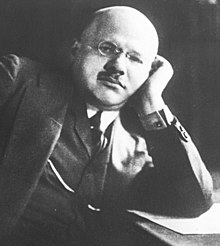Leo case
Leo Fall (born February 2, 1873 in Olomouc , Austria-Hungary , † September 16, 1925 in Vienna ) was an Austrian composer and conductor and one of the most important representatives of the silver operetta era .
Life
Leo Fall, the brother of the composers Richard Fall and Siegfried Fall , who were both deported to concentration camps by the National Socialists because of their Jewish origins and died there, came after visiting the Vienna Conservatory of the Gesellschaft der Musikfreunde , where he a. a. Studied music theory with Robert Fuchs and Johann Nepomuk Fuchs , moved to Hamburg as Kapellmeister in 1892 , then as solo violinist at the Berlin Metropol Theater .
When his first operas were unsuccessful, he became resident composer for the Berlin cabaret Böse Buben in the Berlin Künstlerhaus. There he wrote the music for numerous couplets , e.g. B. zu And Meyer looks at me kindly , which Kurt Tucholsky praised as the classic Berlin couplet. Then the transition to operetta took place. Fall devoted himself exclusively to composition from 1906, made the breakthrough with three operettas (including Die Dollarprinzessin ) from 1907 to 1908 and finally became known worldwide with later works such as Die Rose von Stambul (1916).
Fall, whose works were banned by the National Socialists, is one of the most important composers of the so-called “Silver Operetta Era” alongside Franz Lehár and Oscar Straus .
His musically diversified operettas oscillate between classical (Viennese waltz) and modern motifs (hit, jazz, foxtrot). It was above all the conductor Franz Marszalek , who works for WDR in Cologne , who supported Leo Fall with many exemplary recordings.
In 1901 he became a member of the Bratislava Freemason Lodge Friendship . His grave is in the Vienna Central Cemetery (Israelite part, Gate 4, Group 3, Row 4, No. 1). In 2000 the Leo-Fall-Weg in Vienna- Hietzing was named after him.
Works (selection)
- The Rebel (1905, reworked seven years later to Der liebe Augustin )
- The merry farmer (1907)
- The Dollar Princess (1907)
- The Divorced Woman (1908)
- The Cry for the Slap (1909)
- Little Brother Fine (1909)
- The doll girl (1910)
- The beautiful risette (1910)
- The Eternal Waltz (1911)
- The Siren (1911)
- Dear Augustine (1912)
- The Student Countess (1913)
- The night express train (1913)
- Prime Minister (1914)
- The artificial man (1915)
- The Empress (Fürstenliebe) (1916)
- The Rose of Stambul (1916)
- The Spanish Nightingale (1920)
- Saint Ambrose (1921)
- The street singer (1922)
- Madame Pompadour (1922)
- The Sweet Cavalier (1923)
- Youth in May (1926)
- The young Mr. René (reworking of Der süße Kavalier by Michael Krasznay-Krausz , March 1935 in Zurich), further performances: January 1936 in Prague, September 1951 in Karlsruhe
See also
- Richard Fall (brother)
- Siegfried Fall (brother)
- List of operetta composers
literature
- Edmund Nick : Case, Leo. In: New German Biography (NDB). Volume 5, Duncker & Humblot, Berlin 1961, ISBN 3-428-00186-9 , p. 16 ( digitized version ).
- Leo case. In: Austrian Biographical Lexicon 1815–1950 (ÖBL). Volume 1, Verlag der Österreichischen Akademie der Wissenschaften, Vienna 1957, p. 285.
- Stefan Frey: Leo Fall. Mocking rebel of the operetta , Edition Steinbauer, Vienna 2010, ISBN 978-3-902494-45-0 .
- Marcus Pyka: “We dream of reforms, quite enormous, on the Bosporus”: The Ottoman Empire as a reluctant model in Leo Fall's Rose von Stambul (1916) , in: Archiv Operetta Research Center Amsterdam ( online ).
Web links
- Leo and Richard Fall - online biography and catalog raisonné of Kurt Gänzl from the Encyclopedia of Musical Theater in the archive of the Chicago Folks Operetta
- Literature by and about Leo Fall in the catalog of the German National Library
- Leo Fall in the Internet Movie Database (English)
- Entry on Leo Fall in the Austria Forum (in the AEIOU Austria Lexicon )
- List of stage works by Leo Fall based on the MGG at Operone
- Leo Fall died. In: Neue Freie Presse , Abendblatt, September 16, 1925, p. 3 (online at ANNO ).
Individual evidence
- ^ Karl Bosl : Life pictures for the history of the Bohemian countries . Volume 1. Oldenbourg, Munich 1974, ISBN 348647801X , p. 271 ( limited preview in Google book search).
- ^ Hietzing: naming the Leo-Fall-Weg In: Rathauskorrespondenz from June 9, 2000.
| personal data | |
|---|---|
| SURNAME | Case, Leo |
| BRIEF DESCRIPTION | Austrian composer, conductor and representative of the operetta era |
| DATE OF BIRTH | February 2, 1873 |
| PLACE OF BIRTH | Olomouc |
| DATE OF DEATH | September 16, 1925 |
| Place of death | Vienna |
